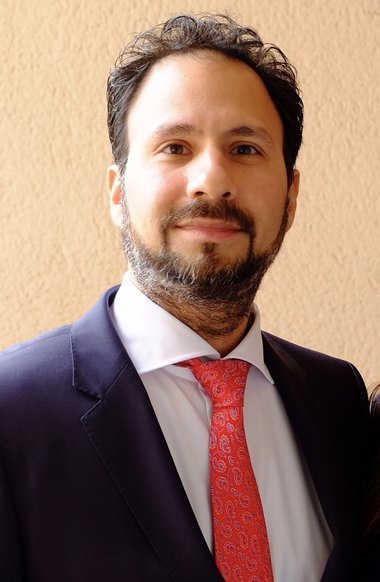13 February 2020
Dr Ronak Rajani collaborated with King’s Health Partners colleagues and industry partners to create a new Transcathter Mitral Valve Assessment Clinic, delivering personalised care to more than 100 patients.
This Valentine’s Day, we went speed-dating with colleagues at King’s Health Partners Cardiovascular to find out how the work they’re doing is improving patient care.
Dr Ronak Rajani [pictured right], tell us about yourself
I am a consultant cardiologist with a specialist interest in heart valve disease and advanced cardiac imaging.
My other interests include running research trials, increasing research activity across south London and exploring new treatments and techniques to improve patient outcomes.
What are you looking for to improve outcomes and patient experience for those with cardiovascular disease in south east London?
The talent that resides within King’s Health Partners never ceases to amaze me.
This extends not only to my clinical colleagues across Guy’s and St Thomas’ and King’s College Hospital NHS Foundation Trusts, but also to the teams at King’s College London. Being able to identify a specific unmet clinical need and then use in-house expertise to develop solutions, enables us to work in an environment that is buzzing with new ideas and innovation.
Professor Simon Redwood, professor in interventional cardiology at King’s College London, and his team, have carried out many world first procedures, including implanting the world’s first transcatheter mitral valves, a therapeutic option for the treatment of severe mitral regurgitation (MR). When I joined the team, I was encouraged to use my talent to help identify potential challenges that some of the new procedures were posing to industry and other clinicians around the world.
This led to me work with academics in the School of Bioengineering and Imaging Sciences at King’s College London, such as Professor Steven Niederer, Dr Adelaide de Vecchi and Dr Pablo Lamata. Together we conducted bench testing and evolved world first technologies to better predict outcomes for patients. This subsequently led to collaboration with multiple industry partners, all with the same aim to improve patient outcomes and deliver personalised care.
This led to the birth of a new Transcathter Mitral Valve Clinic Assessment Clinic. In the last two years, the clinic has seen more than 100 patients from around the country. It uses all of the strength of King’s Health Partners with the ultimate aim to improve patient outcomes using personalised care and state-of-the-art inhouse technology. I do not think that such a venture would have been achievable elsewhere.
Are you looking for something long-term? Where would you like to see this project going?
I see the Transcathter Mitral Assessment Clinic as an initial exploration into this model of clinic delivery. This approach, that we have developed within King’s Health Partners, uses technology and computational modelling to improve the care we give our patients.
Our techniques have been presented by the team at multiple international conferences and the clinic has grown significantly in stature. We now receive referrals from all over the country and our industry partners collaborate with us as a site of excellence to help with the design, testing and implantation of their new devices. This is testament to the full package King’s Health Partners is able to provide to patients: from the technical skill of our interventional cardiologists at Guy’s and St Thomas’ and King’s College Hospital NHS Foundation Trusts, to the patient evaluation and assessment in our specialist cardiac imaging clinics, and the advanced computational modeling techniques developed by our academic colleagues at King’s College London.
Valentine’s Day is all about partnerships. What do you value most about being part of King’s Health Partners?
Working within King’s Health Partners opens endless opportunities for those with an inquisitive mind. It is admirable for a clinician to have a good idea about how to improve patient care. It is more satisfying and rewarding though to have the infrastructure to make these ideas become a reality. King’s Health Partners is the vehicle that enables this. Ultimately the immediate benefit is to our patients, but our work also benefits global healthcare as our experience and science gets disseminated by traditional academic routes.
I am grateful my directorate management team encourages their clinicians to innovate, work across King’s Health Partners and challenge conventional NHS clinical roles. I enjoy working with my colleagues such as Professors Bernard Prendergast, Simon Redwood and John Chambers who support my sometimes “whacky” ideas and give me the opportunity to develop. And of course, my academic partners working in Imaging Sciences at King’s College London, with whom I meet with regularly to discuss new clinical challenges and how we can work together to solve these - Professors Steven Niederer and Sebastien Ourselin, and Dr Pablo Lamata.
Our speed-date with Dr Ronak Rajani is part of a Valentine’s Day series. Don’t miss our Valentine’s Day interviews with Dr Stephen Black, who shares how he and collegues improve care for those living with vascular disease, and the Education Working Group on delivering education for world-leading clinicians.
Interested in learning more about King’s Health Partners Cardiovascular? Visit the Institute’s webpages.





